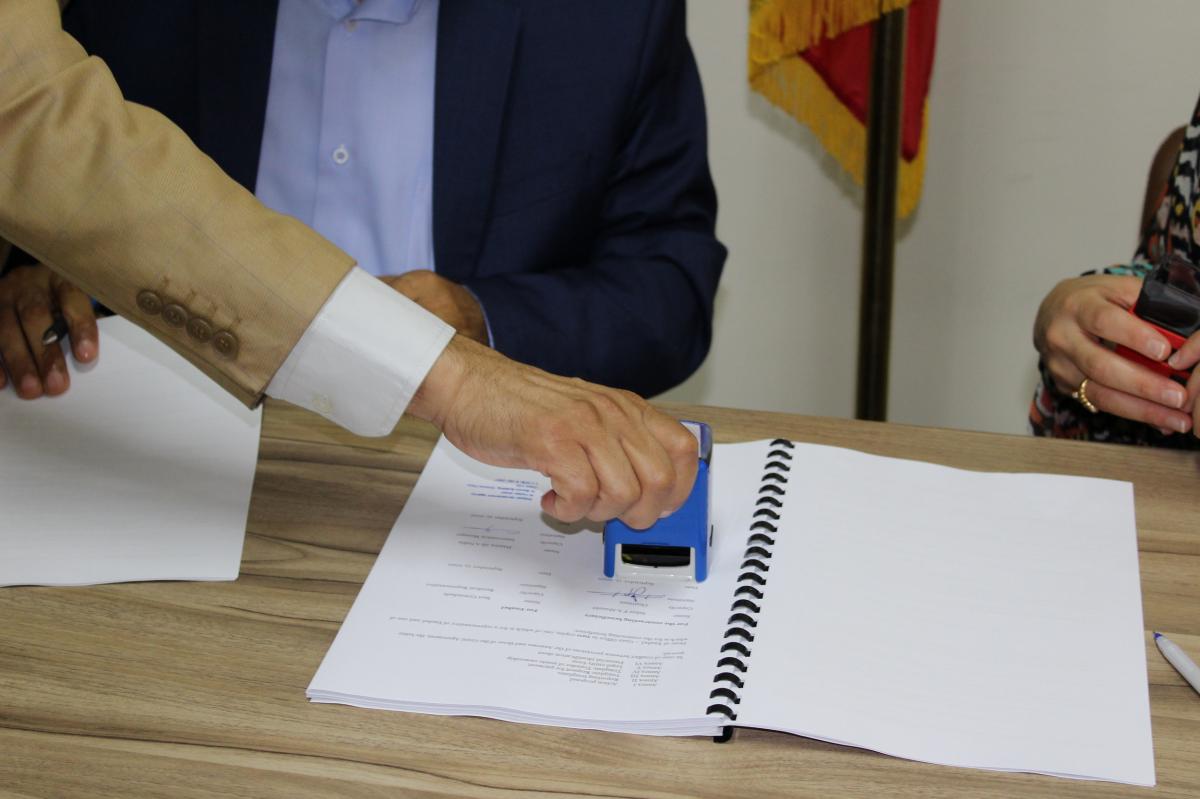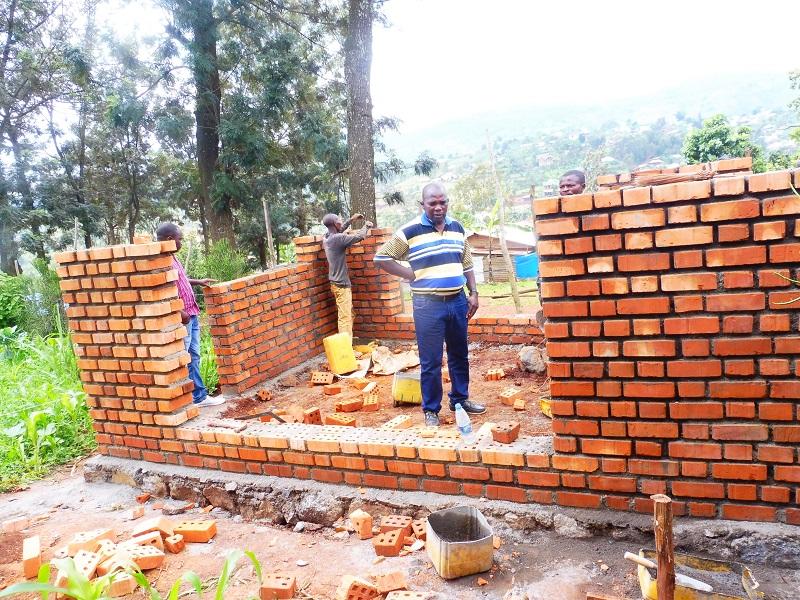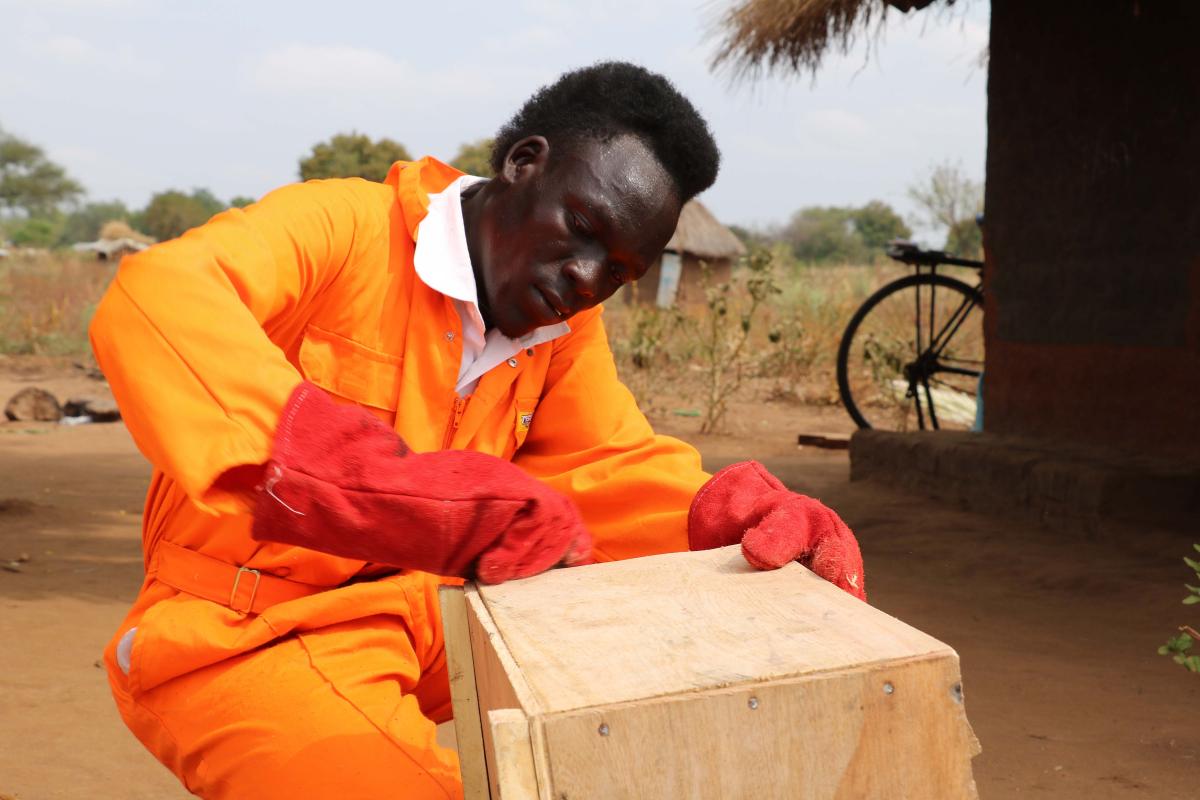Search
Viewing 2130 to 2145 of 3123 news
-
Enabel signs an agreement to start the implementation of SAWA project in Gaza Strip
Roula HANDAL | 17/09/2020
Enabel signed an agreement with the Environment and Development Association (Byader), Centre for Women's Affairs (WAC) and the Palestinian Federation of Industries (PFI) to begin implementing the project "Enhance Resilience for Micro-businesses and Create Sustainable livelihood Opportunities in the Gaza Strip - SAWA" with a budget of €1.650.000 funded by the European Union. SAWA is a 3-year project and aims to contribute to economic resilience in the Gaza Strip through enhancing the resilience and sustainability of micro-businesses in the Gaza Strip and initiating sustainable and innovative green/circular economy initiatives. SAWA meets the urgent needs of the most vulnerable population in marginalized communities in the Gaza strip and seeks to strengthen their economic resilience through focusing on niches among the initiatives of the selected beneficiaries. SAWA also helps facilitate new economic growth opportunities in the field of circular and green economies by providing green solutions to problems identified by the industrial sector and by creating new business opportunities for innovative green entrepreneurs. SAWA will be implemented in a partnership with experienced civil society organizations and private sectors in Gaza Strip following a community-based approach in which their capacity will be upgraded in the field of business development services and green/circular economy allowing them to deliver high quality services to their communities. As such, the project will support the creation of viable and economically sound micro-businesses that are essential for livelihood, self-employment and long-term job creation through providing capacity building, skills enhancement, seed funding coaching and mentoring and technical assistance to vulnerable and marginalized groups. The project will benefit 150 unemployed young people from training opportunities (administrative, financial, and technical), counseling and guidance sessions, grants to create micro-businesses, as well as 30 young entrepreneurs capable of creating innovative solutions in the green/circular economy. SAWA also supports partner institutions from civil society organizations and private sectors by providing capacity-building programs to enhance its institutional capabilities. The agreement was signed at Enabel office in Gaza strip in the presence of representatives of the Belgian development agency and partner institutions. Mrs. Haneen Abu Nahla, SAWA Intervention Officer and Enabel’s Office Manager in Gaza, Dr. Sabri Sabt, Chairman of Byader Foundation, Ms. Amal Siam, Executive Director of the Center for Women's Affairs (WAC) and Mr. Ali Hayek, Deputy Chairman of the Palestinian Federation of Industries (PFI). As per the signed agreement, the project’s implementation starts mid of September 2020 for the duration of 20 months. The representatives of the partner institutions addressed the importance of this agreement in fighting unemployment, poverty, economic empowerment of young people and women, and enhancing the resilience and sustainability of micro-businesses in the Gaza Strip.
-

Irrigation dans l'Imbo Nord: la production agricole augmente de 50% - Burundi
Guido COUCK | 17/09/2020
Dans la province de Cibitoke, les travaux d’aménagement du périmètre Imbo-Nord (3.000 ha) entrepris par le projet PAIOSA ont permis une augmentation des superficies irriguées et une meilleure valorisation des productions agricoles via une gestion plus équitable et durable de l’eau.Ces travaux d'irrigation ont mené à une augmentation de la production brute de plus de 50%.
-

Resilient cities: Wehubit launches a new call for proposals!
Thibaut MONNIER | 15/09/2020
Through this new call for proposals, our Wehubit programme tackles the global challenge of sustainable and inclusive urbanisation as defined in our strategy.This call for proposals is open to any private or public non-profit organisation established in one of the 14 partner countries of the Belgian Development Cooperation which wishes to further develop a digital solution on the theme of resilient cities. These include, for instance, projects focusing on increasing citizen participation in urbanisation, more efficient management of public services reducing environmental impact, solidarity and social cohesion, and much more!Would you like to know more or inform potential partners? Do you know organisations that might be interested?Go to wehubit.be in the financing instruments menu.Participation in this call is open until October 22, 2020.
-
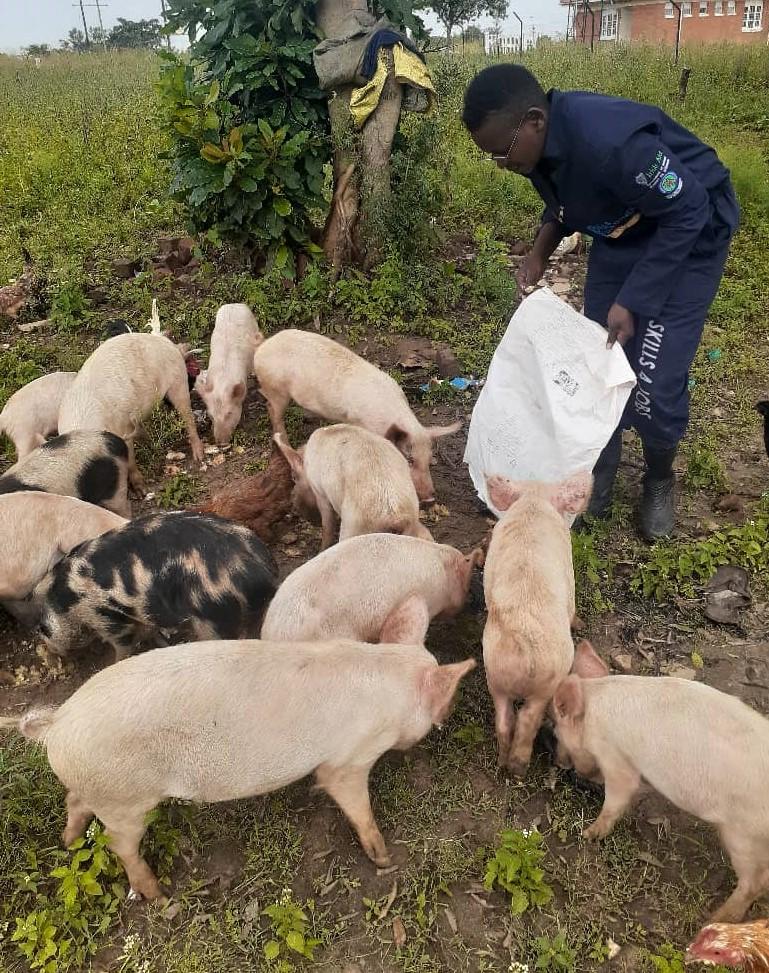
Covid-19 lockdown was a blessing in disguise for Acola Annette - Uganda
Racheal AKELLO | 10/09/2020
For many people, the 3 months lockdown due to the coronavirus pandemic was a challenge. It was hard to survive on meager savings and adjust to the sudden change in the pattern of living where one was required to only stay at home. But for Acola Annette, the lockdown was a blessing in disguise. She got the rare opportunity to venture into her passion. Annette 24, a 2nd-year student at Karamoja’s Nakapiripirit Vocational institute in Uganda had a dream of setting up an animal husbandry farm.Following the closure of schools as a preventive measure to the spread of the COVID -19, she went home with an idea to sell the one cow that her mother has bequeathed her. The UGX 520,000 income from selling her cow, was re-invested to acquire a herd of 5 piglets each at UGX 70,000.” I knew this was the right thing for me to do because this area has many bars and people love eating pork” she reminisces with a smile.Annette’s pig farm has grown to include 13 pigs and she is now also buying local chicken to diversify her farm products. She also grows sorghum, sim-sim, and cassava to help feed the family. “I got the time to try out all the farm projects I had dreamed of because the end of lockdown coincided with the rainy season here in Karamoja,” she says. Annette says that the opening of restaurants has helped the business to grow. She sells 2-3 chicken a week and she is able to earn at least UGX 45,000. Her biggest challenge was feeding animals since they mainly feed on left-overs from restaurants and the pork orders were not anticipated since bars were closed. Annette dreams of becoming a veterinary Doctor at the end of her career.
-
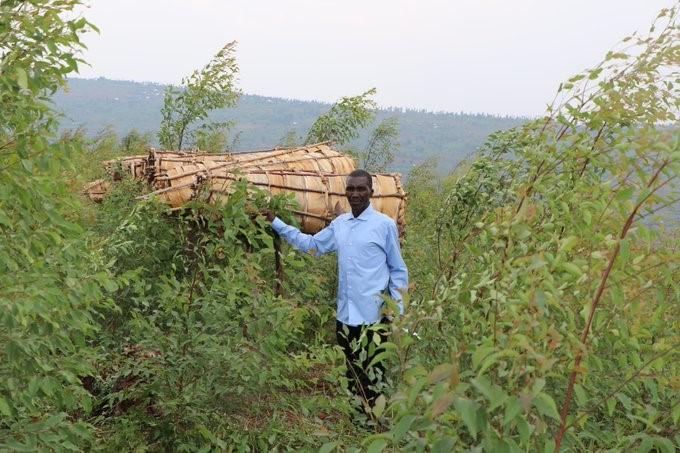
Rehabilitated forests handed over to local cooperatives - Rwanda
Denise NSANGA | 03/09/2020
Forests in Rwanda cover 30% of land use. This is composed of 11.9 % (translated into 283 128 ha) of natural forests and 18.1 % (translated into 714 102 ha) of planted public and private forests. According to 2015 National Forest Inventory report, around 68% of non-protected tree plantation of Rwanda are owned by privates and many are poorly managed and over exploited (stem cut every 2-3 years in average) with a very low standing stock (17 m3/ha vs a standard of around 60-80 m3/ha as stipulated in the National Forest Inventory of 2015) and a productivity 2-3 times less than the ideal average standard of 12m3/ha/year. The lack of organisation of these forest growers working each individually on their very small size parcel has been limiting their performance and their joint knowledge and investment sharing opportunities. In consequence, these private forests were only producing around 0,8 Million of m3/year, while they should provide at least 2M m3 per year. This is why the support of these private forest owners is an essential pillar for the development of the forestry sector and sustain landscape restoration and watershed management.880 Ha of degraded private woodlots have been rehabilitated through the Private Forest Management Units (PFMUs) approach, and handed over to their owners - grouped in 18 cooperatives for sustainable management - in the four districts of intervention: Rwamagana in Eastern Province, Gakenke, Rulindo and Gicumbi in Northern Province. The project has been jointly implemented by Enabel and the Ministry of Environment through Rwanda Forestry Authority, to implement the Rwanda National Forestry Policy, 2018-2023.
-

Enabel, central authorities and local community identify areas of intervention in infrastructure - Rwanda
Denise NSANGA | 28/08/2020
The Urbanisation sector of the current Belgo-Rwandan cooperation is focusing on boosting infrastructure in secondary cities. Three districts namely Rubavu, Musanze and Rwamagana, in Western, Northern and Eastern provinces respectively were targeted for this 28 million Euros project dubbed Urban Economic Development initiative (UEDi). To scale up the infrastructure, a workshop and urban walk is organized in each district of intervention and brings together Enabel, Local Administrative Entities Development Agency (LODA), District authorities, the private sector and other partners for the identification and prioritization of quick-wins projects as well as role sharing among the stakeholders. “With the Urban Walk, we want to understand, together with all the stakeholders, the potentialities of the sites presented by the district and to understand how to work on their development. We want to participate in the construction process of a sustainable vibrant city” Mattias Piani, Intervention Manager, Urbanisation intervention In Rwamagana District, a road connecting the handcraft centre to the city centre of Rwamagana is being built under this project which is operating since January 2020. “We will benefit from this project as it will enable us creating more jobs from the carpentry workshop; having a new market which will boost our businesses; moreover, citizens will be getting jobs from roads construction” Celestin Munyaneza, Private Sector representative in Rwamagana district In Musanze District, construction of the new handcraft centre has recently started and is expected to finish mid-2021. In the city of Rubavu, the construction of interconnecting roads around its handcraft centre is starting soon.
-

Construction of stone arch bridges to facilitate market access in Tanzania
Willem VAN DER VOORT | 20/08/2020
The Sustainable Agriculture Kigoma Region Project (SAKiRP) has a successful component “access to agricultural commodity markets”. The construction of stone arch bridges contributes to this component by facilitating the transportation of agricultural produce and thus reducing the cost of transportation for farmers.Stone arches are a strong and time-tested technology that fits with the local economic reality of expensive industrial materials as opposed to a low labour cost.Due to the elimination of all industrial materials except for cement and thanks to the support of the villages, a stone arch bridge can be built at a cost of only 15 to 20% of an equivalent concrete bridge.At the same time, a stone arch bridge emits 50 to 80% less carbon dioxide than an equivalent concrete bridge.The lower cost reduces the strain on the national infrastructure budget and reinforces the local governments’ autonomy, allowing them to upgrade 10 river crossings with an average district budget rather than 1 crossing in the case of concrete bridge technology. The Tanzanian Rural Roads Agency (TARURA) is an enthusiastic partner of SAKiRP and aims to incorporate the stone arch bridge technology in their organization for future implementation.On the other hand, the involvement of the villages ensures that bridges are only built where there is a real demand.Once the bridge is finished, the same villages will take more care of the bridge they helped building than in the case where an external contractor executed the construction.After a one-year start-up period, SAKIRP has completed 17 bridges and 18 more are under construction. The scale-up of the construction effort will see 70 bridges completed by the end of the project.
-
Construction et réhabilitation de grande ampleur au Sud- Kivu - RDC
Grâce MALI FAIDA | 17/08/2020
Au Sud Kivu, les travaux de consolidation des systèmes d’approvisionnement en eau potable, les stratégies d’assainissement ainsi que de gestion des réseaux d’eau ont commencé sur cinq sites, à savoir Cishadu, Lujambo, Nduba, Idjwi Nord et Miti-Mwendo-Mudaka. Sur les sites de Miti-Mwendo-Mudaka et à Lujambo, les grands travaux de pose de canalisation et construction des ouvrages hydrauliques venaient de démarrer au mois de mars 2020. Les études topographiques ont été faites, les entreprises ont été sélectionnées et la phase active de construction a débutée, coïncidant avec l’arrivée de la Covid-19. Malgré cette situation, le programme eau Sud- Kivu et les entreprises se sont mobilisés pour poursuivre ces grands travaux de construction dont le délai contractuel d’exécution est de 11 mois.
-
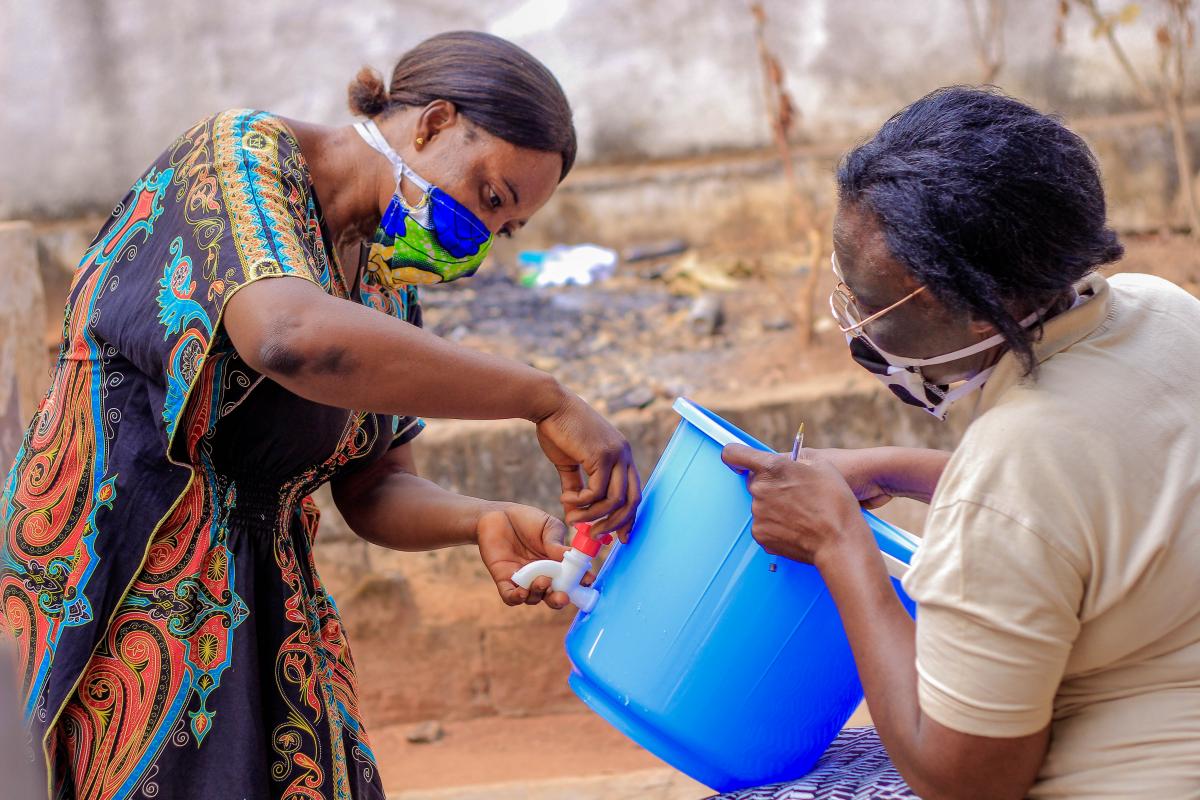
En RDC, mise en place d'activités de sensibilisation à l’hygiène à travers l’eau potable
Grâce MALI FAIDA | 17/08/2020
Le lavage des mains avec du savon est un des moyens les plus efficaces de prévenir les maladies hydriques comme la diarrhée et le choléra qui sont les principales causes de décès chez les enfants de moins de 5 ans.Dans les endroits où il est difficile d’accéder à l'eau potable, il est difficile de trouver des savons, et donc, compliqué de se laver les mains correctement. Les populations de ces endroits reculés ont difficilement accès à des services d’hygiène et d’assainissement de base et aux latrines de qualité car l’eau reste un élément centrale dans un tel processus. Les bonnes pratiques en matière d’hygiène sont pourtant la manière la plus simple et la plus efficace d’empêcher la propagation des maladies.Grâce au partenaire Caritas, des activités de sensibilisation à l’hygiène et à l’assainissement sont mises en place dans les zones couvertes par le programme Eau que sont les régions de Nduba, Cishadu- Buhozi, Lujambo et Idjwi. Les objectifs de ces activités veillent à la promotion de bons comportements en matière d’hygiène, en appuyant une filière de production, de distribution et de commercialisation de savons locaux, des dispositifs de stockage d’eau à domicile pour le lavage des mains, la cuisson et la boisson. Le renforcement des capacités des systèmes de ramassage des déchets ménagers fait aussi partie de ces objectifs. Est donc prévu toute une série de formations et une mise en place de comités d’hygiène qui seront déployés dans toutes les zones ciblées par des spécialistes et également par des animateurs communautaires.
-
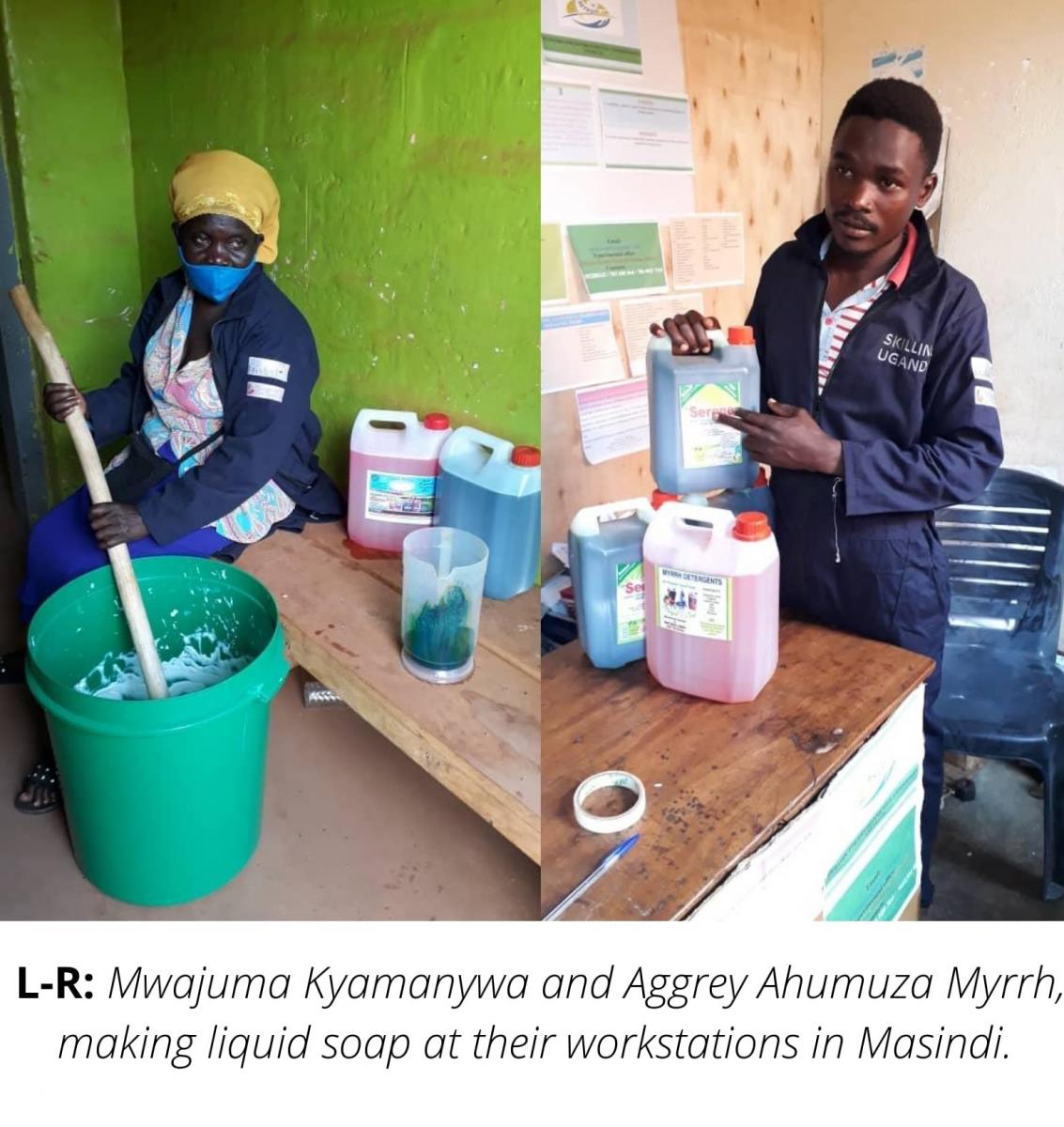
Youth reap rewards from skills training in Uganda
Racheal AKELLO | 12/08/2020
Twenty-eight-year-old Mwajuma Kyamanywa sits in her workshop where she mixes different substances to manufacture soap. It is gratifying to know that a physically challenged youth is making a living by making bar and liquid soap. Mwajuma, a mother of 3 who hails from Masindi, a district in Western Uganda, has had to overcome stigma and discrimination to get to where she is. In November 2019, she enrolled for a 6-day instant training course in liquid detergent and bar soap making at SafePlan Uganda, a local livelihood partner that implements development programs in the district. Instant training is a short competence enhancement training adopted by Enabel to enhance a particular skill.Before this opportunity presented itself, Mwajuma previously sold tomatoes in the market and made Ugx 30,000 (USD 12) per week which was not enough to sustain her family and their needs. The training has helped her multiply her earnings 3 times over to make Ugx 100,000 (USD 28) weekly. “I was able to pay for my son who recently completed his Senior Four studies and joined an institute to study Electrical engineering. I was also able to buy him a computer for his studies,” she says with pride. Mwajuma reveals that she personally chose this path because she prefers to fend for herself than keep begging for help from people. Just like Mwajuma, Aggrey Ahumuza Myrrh is among the many youths in Uganda that benefited from skills training. Aggrey Ahumuza, 24, enrolled for liquid and bar soap training at the same time with Mwajuma. In the past, Aggrey earned his income from small contracts where he carried out short trainings for disabled youth interested in making soap. He sought to improve his skills and decided to join the instant training supported by Enabel. “I have been able to better my soap making skills and now, I sell my soap confidently to my clients because the quality I make meets Uganda National Bureau of Standards (UNBS) criteria,” remarks Aggrey. He also adds that he carried out some research and discovered a mentor who helped him improve on his skill. He is now able to make 6 pieces per every 3 days.With the introduction of the lockdown and emphasis on hygiene due to Covid -19 and frequent washing of hands with soap by the World Health Organisation (WHO), the demand for liquid soap skyrocketed in various places.This development provided an opportunity for Aggrey to supply jerrycans of liquid soap to various clients. This earned him Ugx 1.5m for three months (USD 395). With this money, he has been able to buy baby supplies for his 5-month old baby and take care of the household.Aggrey is looking at the prospect of opening up a soap manufacturing business in Masindi where he produces quality liquid, bar, and bathing soap as well as train people who desire to acquire this skill. As part of the speeches to mark the International Youth Day (IYD), Daniel Akena, Program Manager at SafePlan Uganda encouraged youth like Mwajuma and the needy, to encourage others to enroll in the Skills for jobs training. Akena also said that the IYD should be used to review what young people are doing in terms of skilling and its benefits and if there is need for more resources to support skilling programs. Skills training among the youth has proven to be effective in improving the lives of young people in Uganda. Such interventions lay a foundation for young people in Uganda to be able to look after themselves, make income and look after their households, thus making life better for them. Youth unemployment is an underlying issue in Uganda but with the provision of formal and non-formal training, young people are able to make a living for themselves to overcome this.
-
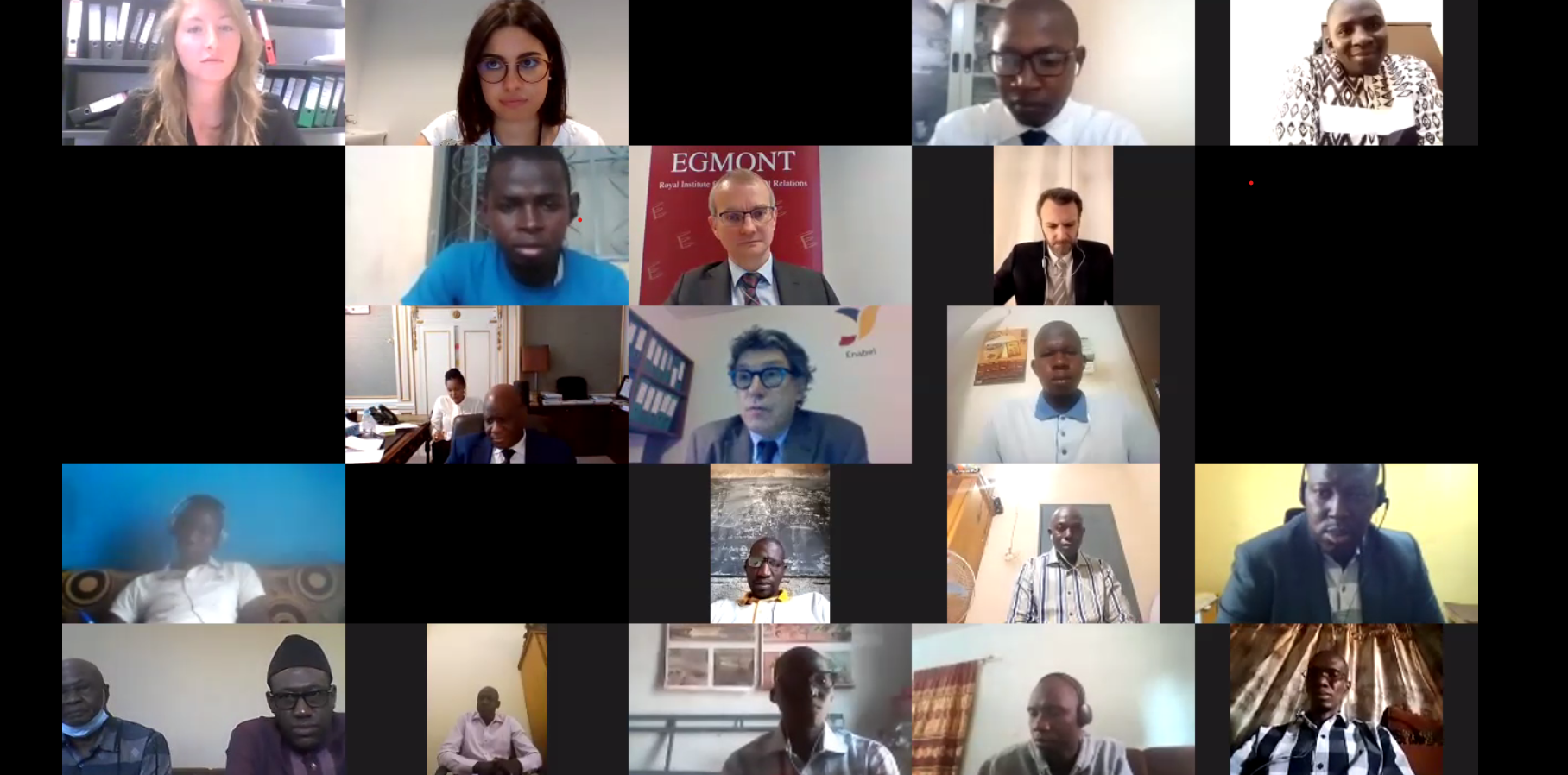
Formation à distance des fonctionnaires stagiaires de l'Ecole Nationale d'Administration au Mali
Nènè TRAORE | 10/08/2020
Le 6 juillet 2020 a eu lieu le lancement officiel de l’ouverture d’une formation organisée en ligne par Enabel au Mali, en partenariat avec l’institut Egmond et l’Ecole Nationale d’Administration Publique (ENA) du Mali. La Belgique érigée comme partenaire incontournable de l’école entend à travers cette session, renforcer les capacités managériales des fonctionnaires stagiaires de l’ENA. En effet l’administration a un rôle majeur à jouer dans le processus de reconstitution du Mali. Le programme de cette cérémonie solennelle a été marquée par les allocutions du Secrétaire Général de l’ENA, du représentant résident d’Enabel au Mali, du 1er secrétaire de l’Ambassade de Belgique au Mali, du Directeur de l’institut Egmont ainsi que son Excellence Monsieur l’ambassadeur du Mali près du royaume de Belgique.Dans leurs allocutions, les intervenants ont salué cette initiative engagée dans le cadre du renforcement des capacités des institutions et des organisations de la société civile au Mali. Par ailleurs ils ont souligné l’agilité dont ont fait preuve l’ENA, L’Institut Egmont et Enabel Mali pour s’adapter au contexte de Covid-19 en passant d’une formation présentielle initialement prévue à une formation en ligne. Il s’agit d’une première en matière de digitalisation de la formation initiale de l’Ecole Nationale d’Administration Publique. Cette séance marque le lancement de la cinquième formation destiné à 74 fonctionnaires stagiaires. Elle a été dispensée en ligne par des experts belges durant deux semaines.
-
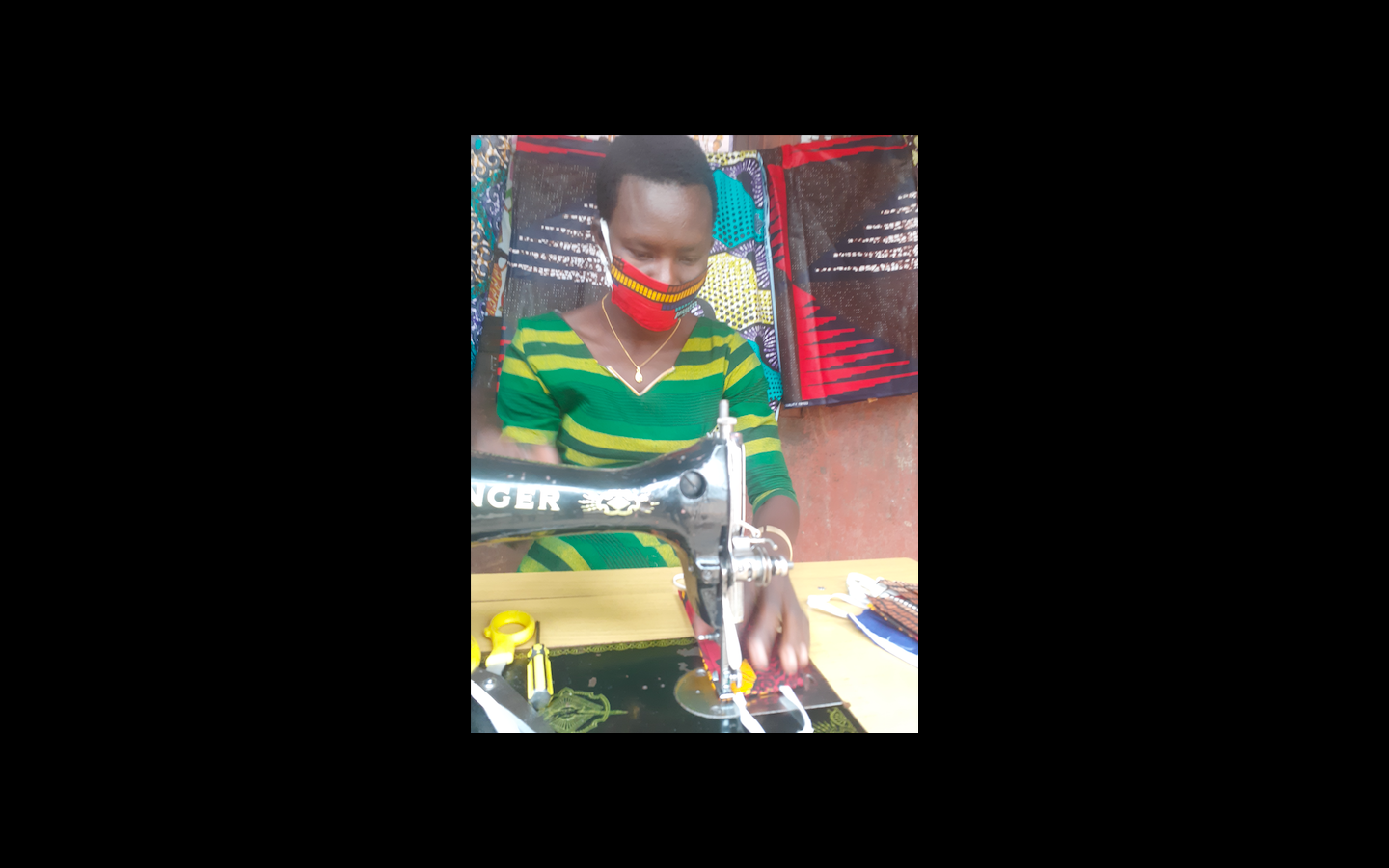
Two Karamojong sisters making money from masks during the Covid -19 period in Uganda
Joseph BASOGA | 30/07/2020
Lucy Sagal and Pascal Sagal are sisters from Matany in Napak District. Esther trained with St. Daniel Comboni Technical institute as a tailor under the Enabel Programme. When she completed the skills training, she opened up a fashion store in Matany town and is now training her Lucy sister to learn the same skill. “Before Covid -19, business was good, I had signed up 3 orders, to make uniforms for St. Daniels Comboni Technical Institute, Kalalong and Longalong Primary schools. But no sooner had I delivered 150 uniforms for Kalalong than the President announced total lockdown” Pascal narrates. It was difficult to survive because they were not allowed to work for about 2 months and we started spending our small capital on food. Rent arrears were also piling up. But hope was restored when the Lorengechora health center in Matany ordered for 58 masks. The two sisters were allowed to open their tailoring store and since then, they have never looked back. They also got another tender to supply over 100 masks to the Truck driver’s association in Matany. Individuals who can afford can also acquire a mask at UGX 1000 on display at the store. While Covid-19 Lock downs in Uganda and beyond has affected many businesses, survival of most small business has been mainly hinged on skills innovation and personal service delivery. Esther used just that to survive. The duo has now diversified to subsistence farming to save on the cost food. “we have grown some G nuts, sorghum and cassava to save on our expenses on feeding”.The sisters say that biggest challenge during the lock down was access to raw material.
-

Sen'Enabel, l'édition n° 1 du magazine d'informations d'Enabel au Sénégal
Aïda SECK | 27/07/2020
Dans ce premier numéro, découvrez le programme multisectoriel d'appui à la lutte contre l'épidémie au coronavirus mis en place pour accompagner l'Etat du Sénégal dans la riposte sanitaire. Enabel Riposte Covid, quelles stratégies pour un système de santé résilient face à l'épidémie de coronavirus? C'est dans Sen'Enabel le Mag…Une production Enabel au Sénégal (Sénégal, juillet 2020).
-
Earning a living from beehives in Uganda
William YEKA | 27/07/2020
It is a hot January afternoon in Imvepi refugee settlement in Arua district, home to almost 80,000 South Sudanese refugees. Twenty-year-old Alison John and his fellow students, both refugees and locals, are busy making beehives out of timber. Even as they are putting the final touches, there is already a buyer for their products. A nearby apiary farm has been purchasing all the beehives produced during the training. Beekeeping is good business in this part of Uganda. Honey goes for as much as 16,000 shillings per liter. The demand is high. The honey from Arua is sold at supermarkets in Kampala and even exported abroad. Ever since John joined the training, organized by the Belgian development agency Enabel, he sees a bright future for himself and his family. His father died a few years ago and John, being the oldest son, became the head of the household. In 2017, when the war engulfed his home area of Yei, he fled with his sick mother and younger brother to Uganda. But life at the settlement was difficult. He found it hard to depend on UNHCR for basic things like food and water. “I wanted to acquire skills that would enable me to earn a living, not only here in the settlement but also after I return home,” he said. At the end of the training, John and his colleagues will receive start-up kits to enable them to set up their own business. They were also equipped with entrepreneurial skills to ensure that the businesses started are well managed. Enabel delivered the training in close partnership with Tornado, the umbrella organization coordinating the beekeeping sector in Uganda and Oxfam.
-
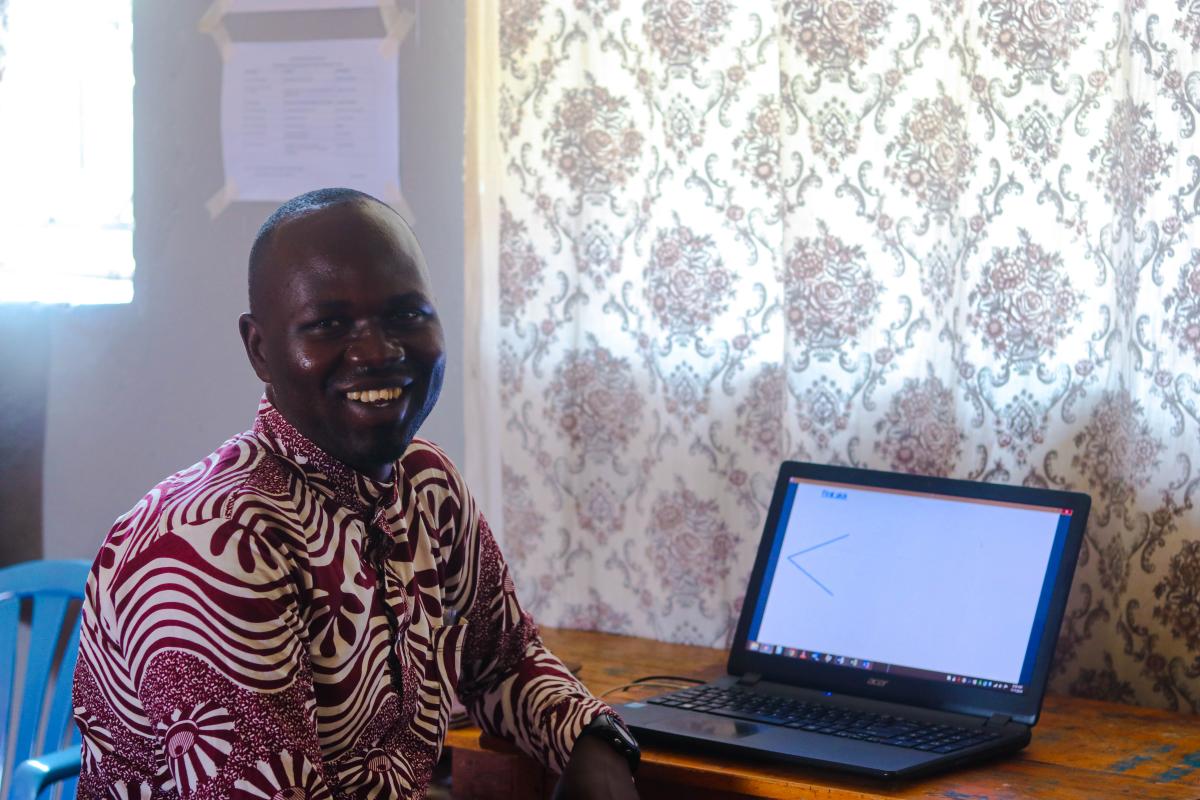
Enabling the continuity of learning - Uganda
Dorothy KYAMAZIMA | 26/07/2020
The impact of the Covid-19 pandemic on the education system In the wake of the Covid-19 pandemic, governments around the world have ordered for the closure of schools in quick succession to contain the spread of the coronavirus. Because of this, more than 60 percent of the world’s learners, around 1.5 billion students are unable to go to school in over 107 countries, according to UNESCO. Given the grand scale of education disruption and the uncertainty of schools re-opening, this has led to a global education crisis. What this means for Uganda is that since March 20th, over 15 million learners are shut out of classrooms and confined to their homes without access to instruction and uncertain of their future.Even though Uganda, has managed to take the necessary steps to ensure that the infection rate in the country remains low, the hope for schools resuming is one that relies heavily on the ability of Education ministry to raise funds for regular testing of learners and teachers in what is termed as the phased reopening of schools. Currently, the Education Ministry’s Covid-19 response plan involves the distribution of home study kits and broadcasting lessons on both radio and television directly to learners at home. This is has created a shift from learning face to face in the classroom to adopting distance learning and virtual teaching methods. Introducing a New Normal with the TTE Sandbox With the significant change to the way learning is presently operating, teachers must inevitably re-skill at a record pace to support the continuity of learning. This means stepping away from traditional teaching methods and embracing the use of technology. A concept that Enabel has long since been supporting in the National Teachers’ Colleges (NTCs) in Uganda. Through the Teacher Training Education (TTE) project, Enabel has placed priority on “leaving no one behind” by investing in sustainable infrastructure, innovations in management and teaching practices in the NTCs that aim at producing competent secondary school teachers.It is from the latter that the distance learning strategy is now established. Dubbed as the ‘TTE Sandbox’, it serves as a testing environment for education technology (EdTech) fully utilizing the potential of teachers to respond to the current education crisis. It introduces ICT tools and educational practices aimed at facilitating and enhancing distance learning during and post Covid-19 pandemic. Through the sandbox, Enabel has organized innovative collaborations with NTC lecturers and ICT champions to introduce new ideas and technologies into the NTC ecosystem. Ensuring communication with staff and students is maintained One of the first steps of the sandbox was to ensure that communication is maintained between NTC management, staff and students. Enabel has provided support for this by using a bulk SMS system. With the availability of 8,000 messages per month, NTCs can customize information to their staff and students in preparation for distance learning and official communication. This is complemented with an annual video conference subscription for each college that allows them to host up to 100 participants and hold an unlimited number of meetings to support management and teaching.Harnessing the Power of Innovation From this sandbox, a virtual hackathon was organized to kick start the lecturers’ involvement and inspire creativity in unpacking the different technologies to plan their digital lessons. More than 70 NTC lecturers participated in this hackathon, each pitching several tools they intended to use to develop and deliver lesson content.Bolla Norbert, a music lecturer from NTC Mubende was one of the participants with a winning pitch on how lecturers could use Google classroom, YouTube, Prezi and WhatsApp to deliver lesson content. The latter being his most remarkable achievement so far. What initially started as a way to keep in touch with students via WhatsApp quickly turned into a lesson delivery tool as more students joined the social media platform. From a class of 38 students, he now has access to 29 learners and shares lessons every day at 3:00 pm.“My desire to learn more about ICT has given me the ability to stay relevant and support my students. I have been sending learning content through WhatsApp and when I realised my students were responsive; I resorted to starting lessons on a regular basis. Now I look forward to using tools that are more sophisticated like Google Classroom. ” Bolla Norbert, NTC Mubende. Realising the potential of teachers Borrowing from this collaborative effort, Enabel also introduced a series of Community of Practice (CoP) sessions taking place every Thursday at 2:30 pm via ZOOM video conferencing. Through these knowledge-sharing events, college lecturers attend virtual meetings where they learn how to use the different digital tools for lesson delivery such as tutorials on screen-casting, podcasting, video conferencing, E-books and padlet among others. These sessions have gained popularity in the teacher colleges as the numbers of participating lecturers have steadily grown from 82 to 160 over a period of 2 months. Esther Katate a female lecturer from NTC Kaliro shares her experience in participating in the CoPs. “I find the demonstrations for each of these digital tools quite fascinating. Because of these sessions, I have been able to introduce lessons using podcasts.” While the concept of CoP sessions is intended for the benefit of lecturers in the teachers’ colleges, the idea has also trickled down to secondary schools. So far, teachers in the network of partner secondary schools surrounding the NTCs have expressed interest and are taking part in these virtual meetings aimed at gaining new skills. Ojok Simon Stephen, a teacher from Ocer Campion Jesuit College, a secondary school in Gulu had this to say.“I have attended four Community of Practice sessions and my favourite tool is PowerPoint because it doesn’t require constant use of the internet. I can work on my laptop and later share work with my students online. It is something am happy to use even when schools resume.”The colleges are also each provided with a 2,000-euro package to support the continuous professional development of their staff by undertaking several online courses. Making sure students access educational resources Aside from the hackathon and the Community of practice sessions, Enabel has invested in setting up a number of interventions to make sure students have access to educational resources during the closing of their NTC. One of these is the ‘Help-desk’; a peer-to-peer support system that consists of lecturers from each of the NTCs. Through the help-desk, lecturers provide support to each other across the colleges to undertake distance learning by developing lesson content with the appropriate ICT tools. When the lesson content is developed, it is then uploaded to a one-stop portal for easy access to both lecturers and students in the teachers’ colleges. Created through Padlet, this portal hosts all teaching and learning resources such as tutorials on ICT for distance learning, lessons developed by lecturers on different subjects and open education resources for secondary education. From lessons learnt to policy development In July, Enabel, organised a high-level eDialogue which brought together participants from the public and private sectors as well as development partners to feed the development of an ICT in education policy. Enabel has supported Uganda’s education sector for about 20 years with a focus on teacher training and vocational education. Even during these times of Covid-19, learning should not wait. The organisation is offering various forms of technical and financial support to ensure learning continuity including engaging authorities about the need to align education with advances in technology.
